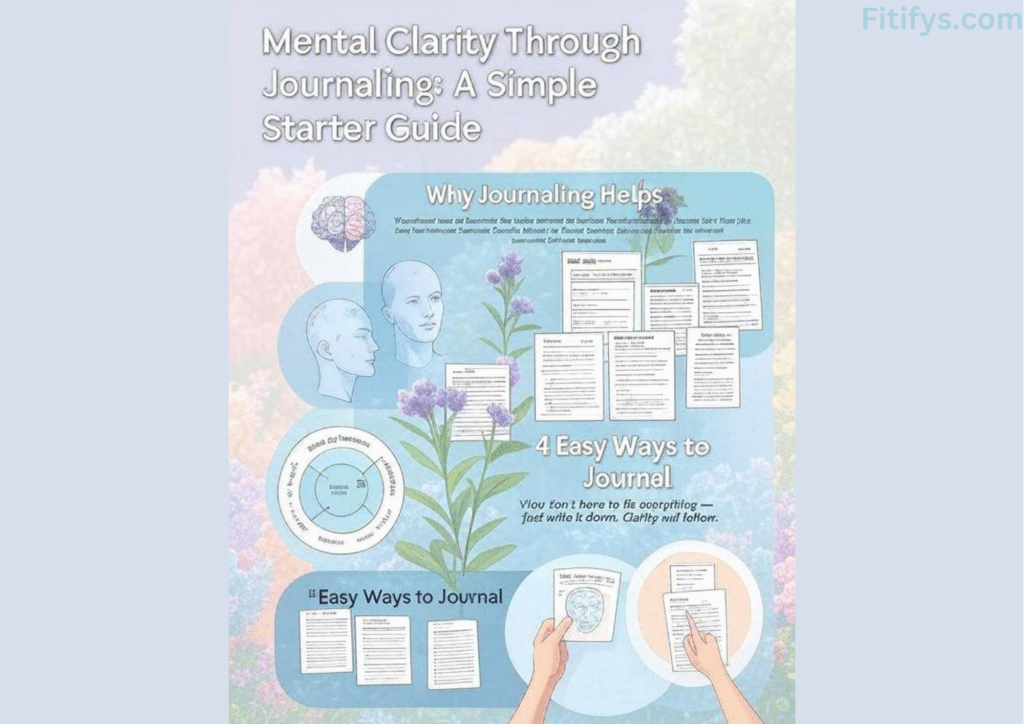The Power of Journaling for Mental Clarity
Ever feel like your mind is just… full?
You’re trying to remember what’s on your to-do list, replaying a weird conversation from earlier, worrying about the future, and wondering if you left the stove on. It’s a lot. No wonder you feel foggy or overwhelmed.
That’s where journaling can help — and no, it’s not just for writers or people who keep leather-bound notebooks under candlelight.
Journaling is one of the simplest and most powerful tools for clearing your mind, sorting your thoughts, and making space to breathe.
Let’s talk about how (and why) to start — and how it can make a real difference in your daily life.
What Is Journaling, Really?
Journaling is simply writing down what’s on your mind. That’s it. There are no rules, no grammar police, and no “right way” to do it.
It can be:
- A brain dump of everything you’re thinking about
- A list of things you’re grateful for
- Notes from your day or reflections on how you’re feeling
- A way to process stress or tough emotions
If you can write a text message, you can journal.
Why Journaling Helps Clear Your Mind
When thoughts stay trapped in your head, they swirl around and grow bigger. Writing them down helps you:
- Sort through your feelings instead of bottling them up
- Notice patterns in your thoughts or behaviors
- Reduce anxiety by getting worries out of your head
- Make better decisions because things become clearer on paper
- Feel more in control when life gets messy
Think of journaling like cleaning your mental desk. You clear the clutter so you can focus on what matters.
A Quick Story: Journaling Helped Me Sleep Again
A friend of mine (let’s call her Jen) used to lie awake at night with a million worries running through her brain. A therapist suggested she try journaling for just 10 minutes before bed.
She started writing down whatever came up: worries, to-do lists, random thoughts. After two weeks, she was sleeping better. She said, “It’s like my brain finally gets to shut off after I write.”
That’s the power of journaling — it makes space for rest.

How to Start Journaling (Even If You Don’t Like Writing)
You don’t need to be a “writer.” You just need a few minutes and something to write with. Here are some beginner-friendly ways to ease into it:
1. The Brain Dump
This is the easiest way to start. Set a timer for 5–10 minutes and write whatever’s on your mind. Don’t worry about grammar or spelling. Just let it all out.
Example:
“Why do I always overthink live? I didn’t say anything wrong, but now I’m spiraling. I should probably drink more water. Also, I need to schedule that dentist appointment.”
No filter. Just you and your thoughts.
2. Gratitude Journaling
This one’s simple and uplifting. Every day, write down:
- 3 things you’re grateful for
- 1 thing you’re looking forward to
- 1 small win from the day
It shifts your focus from what’s wrong to what’s good.
3. Prompt Journaling
Use questions to spark reflection. Try prompts like:
- What’s taking up the most space in my mind right now?
- What do I need more of in my life?
- What am I avoiding, and why?
You can Google journal prompts or check apps like Day One or Presently.
4. Bullet Journaling
Prefer structure? Use bullet points instead of full sentences. Track your mood, habits, sleep, or stress levels — and jot notes as you go.
Example:
- Mood: Anxious this morning, better after lunch walk
- Stress: 6/10
- Reminder: Talk to manager about shifting deadlines
Quick, clean, and super helpful.
When to Journal
There’s no perfect time — just pick what works for you:
- Morning: Helps set the tone for your day
- Evening: Great for unwinding and reflection
- During stress: Grab your notebook and write through it
- Once a week: Even weekly journaling can bring clarity
Tip: Keep a notebook by your bed, in your bag, or on your desk so it’s always handy.
Journaling Isn’t a Cure-All — But It Is a Lifeline
Journaling won’t solve every problem, but it can help you see your problems more clearly. And sometimes, that’s all you need to take the next step.
It’s free. It’s private. And it gives your mind a place to rest.
Final Thoughts: Make It Yours
There’s no “wrong” way to journal. Some people write every day. Some just when things feel heavy. Some people use digital apps; others love a messy notebook.
What matters is that it helps you feel lighter, clearer, and more grounded.
So grab a pen (or open your notes app) and give it a shot. You might be surprised how much better you feel just getting things out of your head and onto the page.
FAQs
1. What if I don’t know what to write about?
Start with how you’re feeling in the moment, or use a journal prompt like “What’s weighing on me today?” It’s okay to begin with “I don’t know what to write.” Your thoughts will start to flow naturally.
2. Do I have to journal every day for it to work?
Nope. Journaling a few times a week — or even just when you’re stressed — can still make a big difference. It’s not about perfection; it’s about support.
3. Is digital journaling as effective as writing by hand?
Both work! Some people find handwriting more calming and connected, while others love the convenience of typing. Choose what feels right for you.







